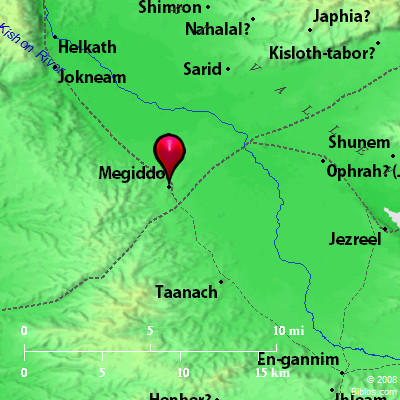Atlas  Megiddo and surrounding area Maps Created using Biblemapper 3.0 Additional data from OpenBible.info You are free to use up to 50 Biblos coprighted maps (small or large) for your website or presentation. Please credit Biblos.com. Occurrences Joshua 12:21 the king of Taanach, one; the king of Megiddo, one;Joshua 17:11 Manasseh had three heights in Issachar, in Asher Beth Shean and its towns, and Ibleam and its towns, and the inhabitants of Dor and its towns, and the inhabitants of Endor and its towns, and the inhabitants of Taanach and its towns, and the inhabitants of Megiddo and its towns. Judges 1:27 Manasseh did not drive out the inhabitants of Beth Shean and its towns, nor of Taanach and its towns, nor the inhabitants of Dor and its towns, nor the inhabitants of Ibleam and its towns, nor the inhabitants of Megiddo and its towns; but the Canaanites would dwell in that land. Judges 5:19 "The kings came and fought, then the kings of Canaan fought at Taanach by the waters of Megiddo. They took no plunder of silver. 1 Kings 4:12 Baana the son of Ahilud, in Taanach and Megiddo, and all Beth Shean which is beside Zarethan, beneath Jezreel, from Beth Shean to Abel Meholah, as far as beyond Jokmeam; 1 Kings 9:15 This is the reason of the levy which king Solomon raised, to build the house of Yahweh, and his own house, and Millo, and the wall of Jerusalem, and Hazor, and Megiddo, and Gezer. 2 Kings 9:27 But when Ahaziah the king of Judah saw this, he fled by the way of the garden house. Jehu followed after him, and said, "Strike him also in the chariot!" They struck him at the ascent of Gur, which is by Ibleam. He fled to Megiddo, and died there. 2 Kings 23:29 In his days Pharaoh Necoh king of Egypt went up against the king of Assyria to the river Euphrates: and king Josiah went against him; and Pharaoh Necoh killed him at Megiddo, when he had seen him. 2 Kings 23:30 His servants carried him in a chariot dead from Megiddo, and brought him to Jerusalem, and buried him in his own tomb. The people of the land took Jehoahaz the son of Josiah, and anointed him, and made him king in his father's place. 1 Chronicles 7:29 and by the borders of the children of Manasseh, Beth Shean and its towns, Taanach and its towns, Megiddo and its towns, Dor and its towns. In these lived the children of Joseph the son of Israel. 2 Chronicles 35:22 Nevertheless Josiah would not turn his face from him, but disguised himself, that he might fight with him, and didn't listen to the words of Neco from the mouth of God, and came to fight in the valley of Megiddo. Zechariah 12:11 In that day there will be a great mourning in Jerusalem, like the mourning of Hadadrimmon in the valley of Megiddon. Encyclopedia MEGIDDO; MEGIDDONme-gid'-o, me-gid'-on (meghiddo, meghiddon; Magiddo, Mageddon, Magdo): A royal city of the Canaanites, the king of which was slain by Joshua (Joshua 12:21). It lay within the territory of Issachar, but was one of the cities assigned to Manasseh (Joshua 17:11 1 Chronicles 7:29). Manasseh, however, was not able to expel the Canaanites, who therefore continued to dwell in that land. Later, when the children of Israel were waxen strong, the Canaanites were put to taskwork (Joshua 17:12 Judges 1:27 f). The host of Sisera was drawn to the river Kishon, and here, "by the waters of Megiddo," the famous battle was fought (Judges 5:19). By the time of Solomon, Israel's supremacy was unquestioned. Megiddo was included in one of his administrative districts (1 Kings 4:12), and it was one of the cities which he fortified (1 Kings 9:15). Ahaziah, mortally wounded at the ascent of Gur, fled to Megiddo to die (2 Kings 9:27). At Megiddo, Josiah, king of Judah, attempted to arrest Pharaoh-necoh and his army on their march to the Euphrates against the king of Assyria. Here the Egyptian monarch "slew him.... when he had seen him," and from Megiddo went the sorrowful procession to Jerusalem with Josiah's corpse (2 Kings 23:29 2 Chronicles 35:20). The sad tale is told again in 1 Esdras 1:25;. "The mourning of Hadadrimmon in the valley of Megiddon" became a poetical expression for the deepest and most despairing grief (Zechariah 12:11). MEGID'DO, most probably at the ruin el Leyjun, near the n.e. base of Mt. Carmel on the s.w. edge of the great plain of Ezdraelon 553 ft. above the Mediterranean and 56 ms. a little w. of n. of Jerusalem. Strong's Hebrew H4023: Mgiddowna tower |



